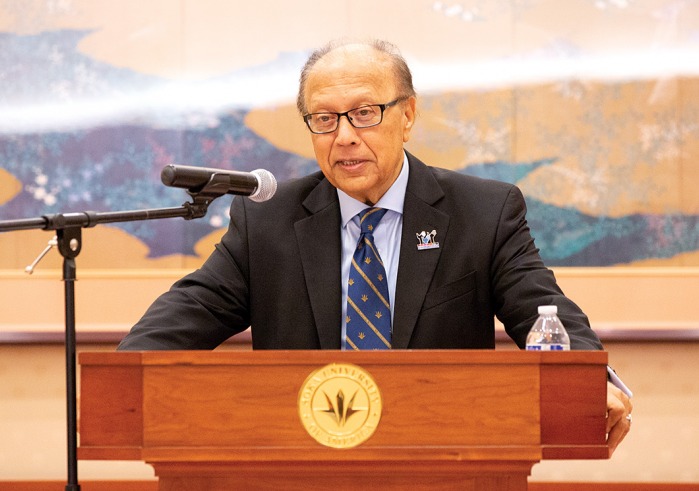SUA Honors Ambassador Anwarul K. Chowdhury With Inaugural Soka Global Citizen Award

In honor of the 20th anniversary of its Aliso Viejo campus, Soka University of America is proud to announce Ambassador Anwarul K. Chowdhury as the recipient of the inaugural Soka Global Citizen Award, for his life’s work and achievements for peace, women’s rights and equality, and for the cause of the world’s poorest and most disadvantaged nations.
SUA President Ed Feasel, who initiated the award that includes $25,000 to carry on the honored work, noted that Ambassador Chowdhury has served as the under-secretary-general and high representative for least developed countries, landlocked developing countries, and small island developing states, president of the UN Security Council, president of UNICEF, permanent representative to the UN and senior special advisor to the UN General Assembly president.
He has received numerous awards including the U Thant Peace Award, UNESCO Gandhi Gold Medal for Culture of Peace, Spirit of the UN Award, University of Massachusetts Boston Chancellor’s Medal for Global Leadership for Peace, 2018 Global Women’s Peace Award, 2020 Robert Muller World Peace Prize for UN Global Peace Leader, and the L’Ordre Nationale from the Burkina Faso government for his championing the cause of landlocked developing countries. In 2003, he received an honorary doctorate from Soka University in Japan for his advocacy for women, children, and the culture of peace. In 2012, he received a Doctor of Humane Letters honoris causa degree from Saint Peter’s University, in Jersey City, NJ. He is a patron of the Committee on Teaching About the UN (CTAUN). He also is a member of the advisory council of the National Peace Academy.
Ambassador Chowdhury’s life work has especially contributed to the practice of the culture of peace and nonviolence. Soon after assuming his position as Bangladesh ambassador to the UN, he initiated a proposal in a letter to UN Secretary-General Kofi Annan that the United Nations General Assembly develop a specific agenda on the culture of peace. He chaired the negotiations among the member states of UN that culminated in the adoption of the 1999 Landmark Declaration and Programme of Action on a Culture of Peace. He also initiated the proclamation of the “International Decade for Culture of Peace and Nonviolence for the Children of the World (2001-2010).” Both were adopted by the UN General Assembly.
Ambassador Chowdhury is the founder of the New York-based coalition of civil society organizations, Global Movement for The Culture of Peace (GMCoP).
In 2020, Ambassador Chowdhury co-authored a book with SUA founder Daisaku Ikeda entitled Creating the Culture of Peace: A Clarion Call for Individual and Collective Transformation.
Ambassador Chowdhury has been a strong and widely respected advocate for the equality of women and women’s rights throughout his career. During his tenure as president of the UN Security Council, Ambassador Chowdhury led the initiative in March 2000 that brought about the political and conceptual breakthrough leading to the adoption of the groundbreaking UN Security Council Resolution 1325 in which the council recognized for the first time the role and contribution of women in the area of peace and security as well as the equality of their participation at all decision-making levels.
Resolution 1325 urges the increase in participation of women and incorporating gender perspectives in all United Nations peace and security efforts. It also calls on all parties to conflict to take special measures to protect women and girls from gender-based violence, particularly rape and other forms of sexual abuse, in situations of armed conflict.
“Without peace, development is impossible, and without development, peace is not achievable,” Chowdhury said, “but without women, neither peace nor development is possible.
“If we are serious about peace and development, we must take women seriously.”
In his role as under-secretary-general and high representative of the UN for the least developed countries, landlocked developing countries and small island developing states, Ambassador Chowdhury was also a well-known champion of these most vulnerable countries and tirelessly worked for mobilizing the international community’s support for the countries in the eradication of poverty and in advancing their human development efforts. He asserted forcefully at a United Nations forum that “the world leaders…need to live up to their responsibility to look after those whose needs are the greatest.”
Public speaking and advocacy for the culture of peace, women’s equality and global citizenship continue to keep him engaged.
Ambassador Chowdhury will be accepting his award during a special virtual celebration of Soka University’s 20th anniversary on May 2 at 5 p.m. PDT. He will be addressing SUA students, staff, faculty, alumni and supporters around the world, sharing his current work for the culture of peace, and women’s equality and empowerment and his message for the students.
“I am proud to hold up Ambassador Chowdhury as a role model for our students,” Dr. Feasel said. “He is truly an inspiration for us all. As Soka University celebrates its 20th anniversary, we are honored that our new Global Citizen Award is shining a spotlight on an individual who is using their wisdom, courage, and compassion to lift up others and improve our world.
“We’re also excited that we will be hosting the World Summit of Educators and sharing their wisdom with others. SUA’s mission is to foster a steady stream of global citizens committed to living a contributive life—people who will give back to their communities and make this world a better place. We hope our entire 20th anniversary year will inspire others to give back to their communities.”
